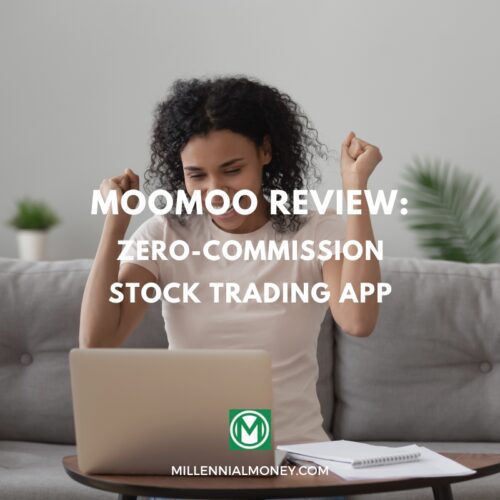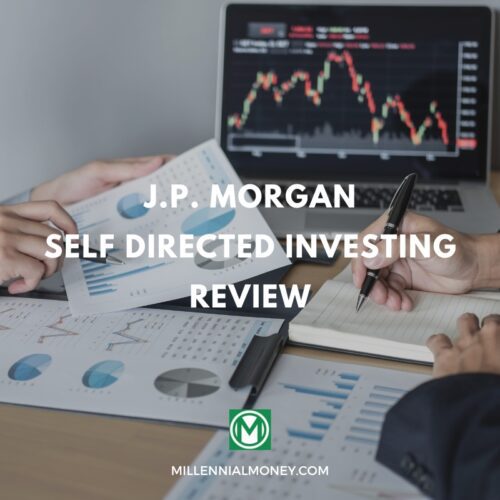Vanguard is one of the largest and most trusted investment institutions in the world. The company offers a wide range of investment products and services, including many of its own low-cost, industry-leading mutual funds and ETFs.
Vanguard also offers personal financial advising services and retirement account options, including traditional IRAs and Roth IRAs.
If you’d like to learn everything there is to know about Vanguard, you’ve come to the right place. This Vanguard review is going to dive into the services they offer and look at the benefits of being a customer and the fees that they charge.
Vanguard Fast Facts
- Founded: 1975
- Headquarters: Valley Forge, PA
- Assets under management: $8 trillion+
- Number of investors: 30 million
- Securities: Stocks, bonds, ETFs, mutual funds, options
- Account types: Brokerage, IRAs, 401ks, trusts, 529, UGMA, UTMA, corporate investment accounts
- Account minimum: $0
- Stock trading fee: $0
- Account fees: $20 per year for accounts with assets under $1 million
- Options trading fee: $1 per contract for assets less than $1 million
- No transaction fee mutual funds: 3,300+
- Customer service: Phone support 8 a.m.-8 p.m. ET, Mon-Fri
Who Vanguard is Best For
Vanguard is best if you’re looking for the following:
- Mutual fund and ETFs: Vanguard is the world’s largest mutual fund advisor and 2nd largest ETF provider. Between its 3,300+ no transaction fee mutual funds and low-cost variety of ETFs, Vanguard is hard to beat for mutual fund and ETF investors.
- Low fees: John Bogle, who graciously sent me a handwritten note before he passed, created Vanguard to make money for clients. It’s owned by its funds, which shareholders own. Rather than paying commissions to employees or bonuses to executives, profits are redirected into the funds to keep fees low for shareholders.
- Long-term investing: Vanguard is best suited to long-term retirement investors looking to buy and hold, rather than active traders.
Vanguard Features
Next, let’s take a look at some of Vanguard’s standout features.
Mutual Funds
Brokerage account holders can invest commission-free in over 180 different Vanguard mutual funds.
Vanguard’s fund specialists have identified a shorter list of Vanguard Select Funds, which were chosen due to being well-diversified among U.S. and International holdings.
These funds also have a long-standing history, making them trusted investment vehicles for your hard-earned money.
Exchange Traded Funds (ETFs)
Vanguard account holders can invest in a range of Vanguard-owned and operated ETFs. See the complete list of the ETFs that you’ll have access to as a Vanguard customer.
Vanguard has also identified a shortlist of Vanguard Select ETFs that stand out due to their combination of diversification, liquidity, and low costs.
CDs and Bonds
If you’re looking for fixed-income investments, Vanguard offers a wide range of CD and bond options. These products are available to purchase through your standard Vanguard brokerage account.
The minimum investment for a Vanguard CD is $1,000.
Learn More:
Money Market Funds
Vanguard offers several money market funds if you’re looking for no-risk, high-liquidity cash investment options.
The benefit of investing in Vanguard’s money markets (i.e., instead of CDs) is that you have access to your funds at any time without incurring an early-withdrawal penalty.
The minimum deposit to open a money market account is $3,000.
Personal Advisor Services
The Vanguard Personal Advisor Service connects you with a financial advisor who can help you plan and pursue your financial goals.
If you have under $500,000 in investments, you’ll be able to speak with someone on a team of advisors. If you have over $500,000 in investments, you’ll be paired with a dedicated advisor.
Vanguard Digital Advisor
Vanguard’s robo-advisor service is a great match for passive retirement investors, helping you create custom goals.
When you invest a minimum of $3,000, Vanguard will rebalance your investments to keep you on track.
The service does come with a low fee, charging a max of $2 per year for every $1,000 of funds it manages. If you want to give the service a try, Vanguard offers a 90-day fee-free trial.
Learn More:
My Watch List
One of Vanguard’s handiest tools is My Watch List. This feature lets registered Vanguard account holders make up to 6 lists, with 30 securities or funds in each. You can use these lists to track each one’s price and returns over the last 10 years.
The website also has a free public version you can use to view data on Vanguard Funds.
Educational Tools
Vanguard’s website is packed with educational resources. You can find articles, podcasts, and videos on a wide range of personal finance topics in Vanguard’s Learn Library.
There are also practical resources like calculators, screening tools, charting, fund comparisons, and goal-setting tools to help you with investing and retirement planning.
Pricing and Fees
Vanguard’s reputation is pillared on charging low fees to customers.
The company does charge a $20 annual account fee for brokerage accounts with less than $1 million in total qualifying Vanguard assets. However, you can waive the fee by enrolling in paper statements.
Vanguard doesn’t charge trading commissions on Vanguard ETFs and most Vanguard mutual funds (ETF or Mutual Fund, what’s the difference?). More than 3,000 non-Vanguard mutual funds are also commission-free, while a small transaction fee applies to upwards of 6,000 other non-Vanguard funds.
There are no fees to trade stocks online; however, trading over the phone comes with a $25 advisory fee. When it comes to options, you’ll only pay a $1 contract fee, whether online or over the phone.
| Account Minimum | $0 |
| Funding Minimum | Stocks/ETFs: 1 share Mutual Funds: starts at $1,000 |
| Stock Trades | $0 |
| ETF Trades | $0 |
| Option Trades | $0 + $1-per-contract fee |
| Mutual Fund Trades | Vanguard Funds: $0 Other: $0+ |
| Account Fees | $20 annual account fee (*waived when you enroll in e-statements) |
| Investments | Stocks, ETFs, Mutual Funds, Options, CDs, Bonds |
Check out the fees section of their website for a full list of the fees Vanguard charges.
Getting Started
To sign up for a Vanguard account, go to their website and click on the OPEN AN ACCOUNT button near the top right-hand corner.
You’ll be walked through a simple sign-up process where you’ll enter personal information and link your external bank accounts so you can deposit funds.
Once you are signed up, you can download their user-friendly mobile app.
Security
Vanguard offers leading-edge security features—like voice recognition and two-factor authentication for account access. The company also has hundreds of technology professionals whose primary goal is to keep your accounts safe.
In fact, they even “ethically hack” their own systems and employ threat scientists to test for system vulnerabilities.
Customer Support
Customer support is available over the phone from 8 a.m. to 8 p.m. Eastern Time at 1-877-662-7447.
Pros and Cons
Here are some of the main pros and cons of Vanguard:
Pros:
- Assets: Vanguard offers some of the best mutual funds and ETFs on the market. You can choose from a library of over 3,300 no-transaction-fee mutual funds and ETFs.
- Fee structure: You’ll pay lower asset management fees than most competitors charge (for long-term investments)
- Customer service: Vanguard is highly reviewed for its helpful customer support agents and advisors, who provide exceptional assistance and advising services.
- Investor-first philosophy: Jack Bogle created Vanguard for investors, giving assurance that Vanguard has your best interests in mind.
Cons:
- Mutual fund minimums: Vanguard’s minimum requirement for mutual funds ranges from $1,000-$3,000, depending on the type of fund. This can be steep for some beginning investors.
- User experience: Vanguard’s website and app are easy to navigate, but they lack some of the innovative tools and features of newer and more advanced trading platforms.
Alternatives to Vanguard
Here are some of the larger online brokers that offer similar services to Vanguard:
- Charles Schwab
- Fidelity
- Merrill Lynch
What’s more, Blackrock’s iShares division is the largest provider of ETFs in the world (the only provider larger than Vanguard).
INVESTMENT AND INSURANCE PRODUCTS ARE: NOT A DEPOSIT • NOT FDIC INSURED • NO BANK GUARANTEE • MAY LOSE VALUEFrequently Asked Questions
Is Vanguard or Fidelity better?
This is a matter of personal preference. Vanguard offers a wider range of funds and ETFs and might be a better choice for long-term investors. On the other hand, Fidelity has over 190 financial planning offices, so you may opt to go with Fidelity if you prefer to have an in-person experience with your investment firm.
Learn More:
- Read our review of Vanguard vs. Fidelity
Is investing with Vanguard a good idea?
Yes. Investing with Vanguard is a good idea, and I definitely recommend doing so. In full disclosure, I have been a happy Vanguard customer for many years now—long before I started Millennial Money.
In fact, Bogleheads Guide to Investing—which was inspired by Vanguard founder John Bogle—was formative for me when I started on my journey to financial independence.
What are the best-performing Vanguard funds?
Everyone has different investing preferences and goals, so it’s important to do your homework before selecting any fund that you invest in. Vanguard funds are traditionally considered to be “buy and hold” funds.
That said, here are some of the top-performing Vanguard funds that you may want to look into:
- Dividend Growth Fund (VDIGX)
- Balanced Index (VBINX)
- Total Stock Market Index (VTSMX)
- Total Bond Market Index (VBMFX)
- Total International Stock Market Index (VGTSX)
Billionaire investor Warren Buffett likes these five funds:
- 500 Index Fund Admiral Shares (VFIAX)
- Mid-Cap Index Fund Admiral Shares (VIMAX)
- FTSE All-World ex-US Small-Cap ETF (VSS)
- Short-Term Government Bond ETF (VGSH)
- Consumer Staples ETF (VDC)
Why is Vanguard so cheap?
A primary factor is the sheer volume of assets under management that they have—over $8 trillion.
What’s more, Vanguard can keep expenses down by minimizing the number of brick-and-mortar branches they have. “We don’t have branches on every corner,” a super helpful phone agent recently explained to me.
Is Vanguard a Good Investment Option?
It’s hard to find a better company than Vanguard for long-term retirement savings.
If you’ve made it this far, you can probably tell that I’m a fan of Vanguard. But at the end of the day, whether you are investing your money with Vanguard or with one of its competitors, it won’t make that much of a difference.
What will have the most significant impact on your ability to achieve financial freedom is having a smart approach to how you’re saving, investing, and spending your money. Thanks for reading, and here’s to being wise about your financial decisions!
For more information about Vanguard funds, visit vanguard.com to obtain a prospectus or, if available, a summary prospectus. Investment objectives, risks, charges, expenses, and other important information about a fund are contained in the prospectus; read and consider it carefully before investing. Vanguard Marketing Corporation, Distributor of the Vanguard Funds.
*For the ten-year period ending December 31, 2019, 9 of 9 Vanguard money market funds, 58 of 73 bond funds, 22 of 23 balanced funds, and 125 of 140 stock funds, or 214 of 245 Vanguard funds, outperformed their peer-group averages. Results will vary for other time periods. Only mutual funds and ETFs (exchange-traded funds) with a minimum 10-year history were included in the comparison. Source: Lipper, a Thomson Reuters Company. The competitive performance data shown represent past performance, which is not a guarantee of future results. Visit vanguard.com for updated Vanguard fund performance.
**Vanguard average mutual fund expense ratio: 0.10%. Industry average mutual fund expense ratio: 0.57%. All averages are asset-weighted. Industry averages exclude Vanguard. Sources: Vanguard and Morningstar, Inc., as of December 31, 2019.
Disclaimer: All investing is subject to risk, including the possible loss of the money you invest. Advice services are provided by Vanguard Advisers, Inc., a registered investment advisor, or by Vanguard National Trust Company, a federally chartered, limited‐purpose trust company.






No comments yet. Add your own